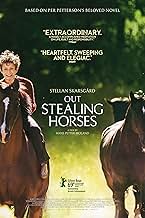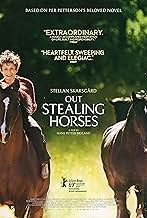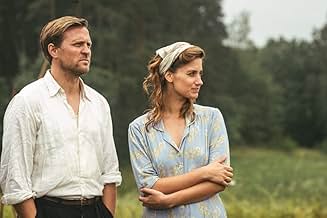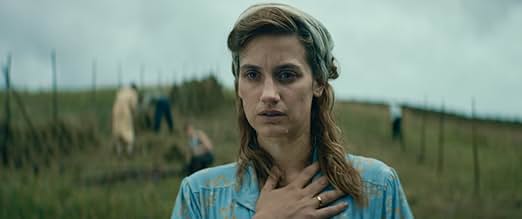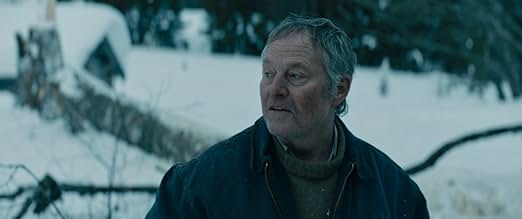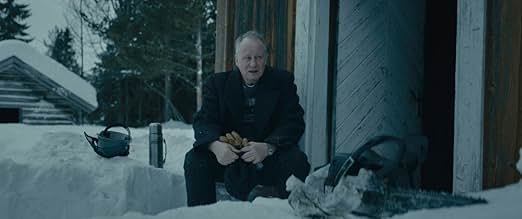IMDb RATING
6.5/10
3.5K
YOUR RATING
A grieving widower moves to the country where a chance encounter rekindles memories from his past.A grieving widower moves to the country where a chance encounter rekindles memories from his past.A grieving widower moves to the country where a chance encounter rekindles memories from his past.
- Director
- Writers
- Stars
- Awards
- 7 wins & 11 nominations total
Tone Beate Mostraum
- Tronds mor
- (as Beate Mostraum)
Anders Baasmo
- Olav
- (as Anders Baasmo Christiansen)
- Director
- Writers
- All cast & crew
- Production, box office & more at IMDbPro
Featured reviews
What a amazing talent of working ,beautiful piece of work a unrest soul coming out from Director.
Very deep soulful and strong acting.Very emotional movie.
Every apparently unspectacular event, from the felling of a tree to the galloping of a restless horse, takes on a narrative value, a truly beautiful film
Full of fascinating...ographies and curious adolescent...chologies but as bland as wallpaper paste mixed with plain flour, only curiosity is why they've stolen your sleep sheep and replaced them with this - same effect - lights out!
Greetings again from the darkness. Contrasts are plentiful in this film. The bleakness of winter versus the greenery of summer. The resignation of old age versus the naivety of youth. Pet Petterson's award-winning novel was released in Norway in 2003, and then in English version in 2005. Norwegian director Petter Moland tackles it with the best intentions, though the nuances prove too much for one movie. Mr. Moland is a fine director as evidenced by his excellent IN ORDER OF DISAPPEARANCE (2014) with Stellan Skarsgard and the English remake COLD PURSUIT (2019) with Liam Neeson.
Morland and Skarsgard reunite as the actor takes on the role of the elder Trond, who we first see as he has relocated to Norway from Sweden. Through his narration, we learn Trond has lived in Sweden for 42 years, and it's a chance meeting with his new neighbor Lars (Bjorn Floberg) that triggers memories of one summer when he was 15 years old. It's now 1999, and the impending new millennium has Trond self-isolating on top of the grief and loneliness he has carried since his wife was killed in a car crash. Skarsgard is an actor who can be either sympathetic or powerful, and he brings gravitas to a character who is mostly lost at this late stage in life.
Much of the film is spent in Trond's flashback to 1948, when he lived the summer with his father, a "practical" man, at his cabin in Norway. Young Trond is played very well by Jon Ranes in his first role. He clearly admires his father (Tobias Santelmann, KON-TIKI, 2012) and enjoys working beside him and taking rain showers alongside. Over the weeks, Trond and his father become entangled with a village family after a tragedy involving Lars (the future neighbor) when he was very young, and Lars' father and mother (Danica Curcic). What follows for Trond are the things in life that cause us to alter our view of people and the world. Lost innocence is rarely easy.
Cinematographer Rasmus Videbaek (A ROYAL AFFAIR, 2012) captures the beauty of nature during the 1948 summer, as well as the stark white stillness of 1999 winter. Some of the look and feel and symbolism reminds of the work of Terrence Malick. The stunning Norwegian landscapes play a role for us as viewers and for Trond. There are also some quiet moments that carry weight between the elder Lars and Trond, as the missing pieces of life slowly fall into place.
The elder Trond states his goal is "to sleep as heavily as possible without being dead", but we see part of him may have already died. Flashbacks to that summer, and even earlier during the war, combine with some awkward conversations with Lars to fill in gaps that had blurred over the years. Childhood memories from old age are often not to be trusted, but coming to grips with one's family and the past may bring peace - or it may not. Trond is an avid reader of Dickens' "David Copperfield" and there are many references throughout. He's even given life advice: "Don't be bitter", which is a worthy goal for all. It's an odd film with multiple timelines and damaged characters at different stages. It may not reach the level of Petterson's novel, but director Moland gives us plenty to mull.
Morland and Skarsgard reunite as the actor takes on the role of the elder Trond, who we first see as he has relocated to Norway from Sweden. Through his narration, we learn Trond has lived in Sweden for 42 years, and it's a chance meeting with his new neighbor Lars (Bjorn Floberg) that triggers memories of one summer when he was 15 years old. It's now 1999, and the impending new millennium has Trond self-isolating on top of the grief and loneliness he has carried since his wife was killed in a car crash. Skarsgard is an actor who can be either sympathetic or powerful, and he brings gravitas to a character who is mostly lost at this late stage in life.
Much of the film is spent in Trond's flashback to 1948, when he lived the summer with his father, a "practical" man, at his cabin in Norway. Young Trond is played very well by Jon Ranes in his first role. He clearly admires his father (Tobias Santelmann, KON-TIKI, 2012) and enjoys working beside him and taking rain showers alongside. Over the weeks, Trond and his father become entangled with a village family after a tragedy involving Lars (the future neighbor) when he was very young, and Lars' father and mother (Danica Curcic). What follows for Trond are the things in life that cause us to alter our view of people and the world. Lost innocence is rarely easy.
Cinematographer Rasmus Videbaek (A ROYAL AFFAIR, 2012) captures the beauty of nature during the 1948 summer, as well as the stark white stillness of 1999 winter. Some of the look and feel and symbolism reminds of the work of Terrence Malick. The stunning Norwegian landscapes play a role for us as viewers and for Trond. There are also some quiet moments that carry weight between the elder Lars and Trond, as the missing pieces of life slowly fall into place.
The elder Trond states his goal is "to sleep as heavily as possible without being dead", but we see part of him may have already died. Flashbacks to that summer, and even earlier during the war, combine with some awkward conversations with Lars to fill in gaps that had blurred over the years. Childhood memories from old age are often not to be trusted, but coming to grips with one's family and the past may bring peace - or it may not. Trond is an avid reader of Dickens' "David Copperfield" and there are many references throughout. He's even given life advice: "Don't be bitter", which is a worthy goal for all. It's an odd film with multiple timelines and damaged characters at different stages. It may not reach the level of Petterson's novel, but director Moland gives us plenty to mull.
7OJT
Out stealing horses (Ut å stjæle hester) is a very careful adaption of the very successful novel with the same name by Norwegian author Per Petterson, a novel which have solid millions in at least 50 languages. The film won the silver bear in The Berlin International film Festival.
Let this be said up front: if you're not up to watching a slow storytelling, and not able to sense the small and careful waves of air, glimmers of sun and the wet sensation of rain woven into the nostalgia here, this film will not be for you. You need to be completely at ease when watching, otherwise the film will feel very slow.
Hans Petter Moland has made a film true to the poetic and nostalgic tone of the book, which tells the story about a newly pensioned man, in grieve after the loss of his wife, moving out in the remote countryside, not too far from where he have had childhood memories. The he randomly meets a neighbor which he realizes he must have known some 50 years back. This brings back a lot of forgotten memories from the past. Memories of fondness and great tragedy.
The film is slo and thoughtful, with a stark nostalgic thread, but also a tiny fracture of humor. The film is very sensible, with a lot of thoughts put into photography, with pictures of grass and wind. The film is narrated by the mans telling voice, which in this case adds to the feeling of storytelling. A work of art of a film!
Let this be said up front: if you're not up to watching a slow storytelling, and not able to sense the small and careful waves of air, glimmers of sun and the wet sensation of rain woven into the nostalgia here, this film will not be for you. You need to be completely at ease when watching, otherwise the film will feel very slow.
Hans Petter Moland has made a film true to the poetic and nostalgic tone of the book, which tells the story about a newly pensioned man, in grieve after the loss of his wife, moving out in the remote countryside, not too far from where he have had childhood memories. The he randomly meets a neighbor which he realizes he must have known some 50 years back. This brings back a lot of forgotten memories from the past. Memories of fondness and great tragedy.
The film is slo and thoughtful, with a stark nostalgic thread, but also a tiny fracture of humor. The film is very sensible, with a lot of thoughts put into photography, with pictures of grass and wind. The film is narrated by the mans telling voice, which in this case adds to the feeling of storytelling. A work of art of a film!
Did you know
- TriviaTobias Santelmann, Pål Sverre Hagen and Anders Baasmo previously worked together on Kon-Tiki (2012), as Knut Haugland, Thor Heyerdahl, and Herman Watzinger respectively.
- SoundtracksVindhester
Composed by Kåre Vestrheim
- How long is Out Stealing Horses?Powered by Alexa
Details
- Release date
- Countries of origin
- Official site
- Languages
- Also known as
- L'été où mon père disparut
- Filming locations
- Production companies
- See more company credits at IMDbPro
Box office
- Budget
- €4,100,000 (estimated)
- Gross worldwide
- $1,480,790
- Runtime
- 2h 3m(123 min)
- Color
- Aspect ratio
- 2.35 : 1
Contribute to this page
Suggest an edit or add missing content



